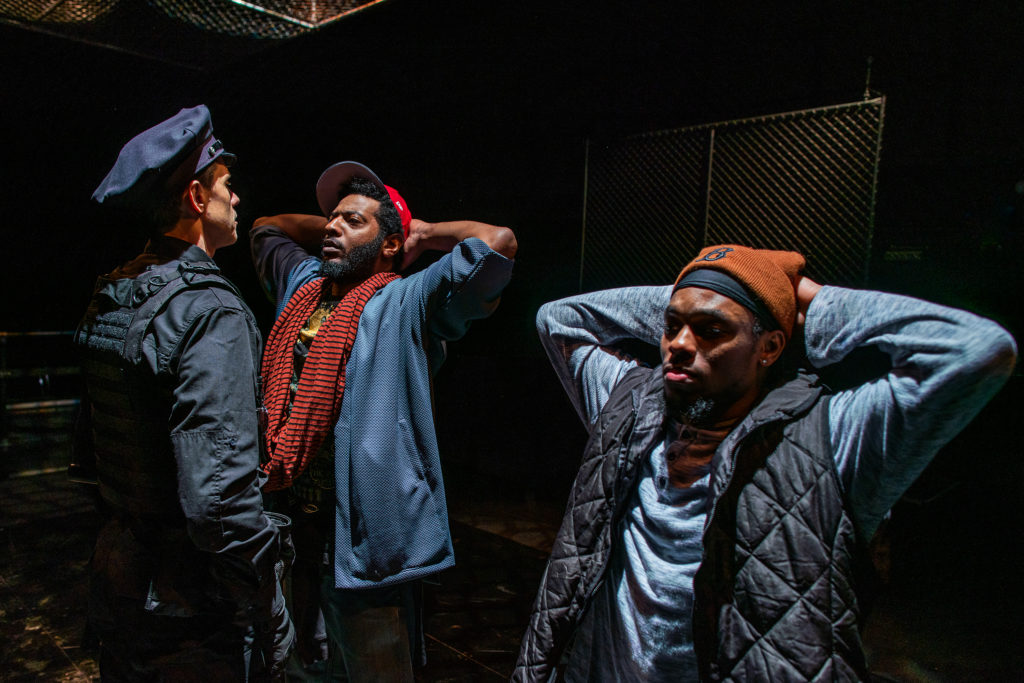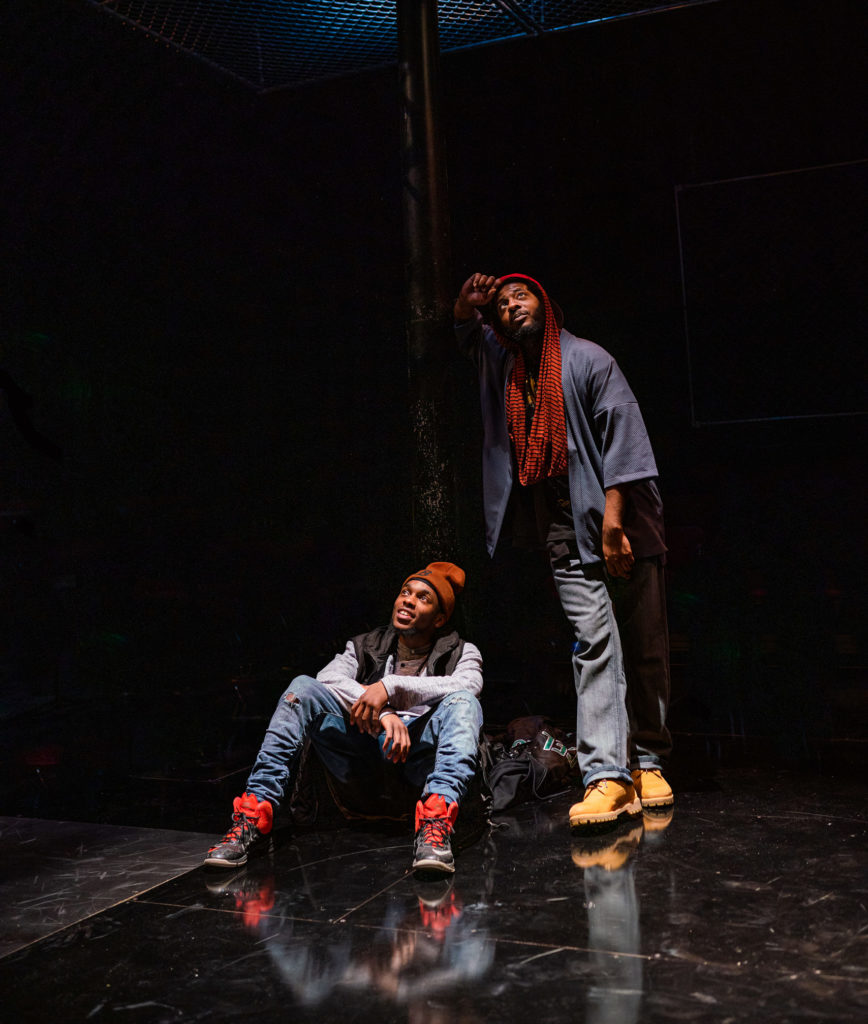
Photo by Nile Scott Studios; Lewis D. Wheeler, Kadahj Bennett, Hubens “Bobby” Cius
Presented by SpeakEasy Stage Co. with The Front Porch Arts Collective
By Antoinette Nwandu
Directed by Monica White Ndounou
Fight choreography by Brandon G. Green
Movement coaching by Mila Thigpen
Dramaturgy by Pascale Florestal
January 3 – Feb. 2, 2020
Calderwood Pavilion at the Boston Center for the Arts
SpeakEasy on Facebook
The Front Porch on Facebook
Critique by Kitty Drexel
Trigger warning: white guilt, language, fuck the police
(Boston, MA) The sheer volume of what one must understand as true regardless of personal belief in order to not merely understand but thoroughly digest Antoinette Nwandu’s Pass Over at SpeakEasy Stage is overwhelming. The role that white people play in perpetuating racism’s systemic horrorshow machinations against Black people (and all people of color) is astounding.
Here is a list of links containing basic concepts that could be helpful.
- It is not the responsibility of Black people to explain racism or to convince white people that it exists.
- Being nice isn’t the same as not being racist. Racist people are nice all of the time. Nice people are racist all the time.
- Black friends won’t make a white person less racist. Dismantling internalized racism requires a lifetime of work.
- It should go without saying that Black people want equality. They don’t want to reverse their treatment at the hands of white people back onto white people.
- Racism is about power. Reverse racism doesn’t exist.
- White people have to stop taking personally Black resistance to oppression.
- All of this information is a Google search away.
Audience members are lucky that Pass Over’s program booklet contains more useful information. It has an interview with Antoinette Nwandu, an essay by Isaiah Matthew Wooden, PhD. called “Traps and Tramps in the Black Lives Matter Era” that discusses liberation and that famous Samuel Beckett play; dramaturg Pascale Florestal wrote a timely examination of colloquial word use called “The N-Word: A Slur Reclaimed?” This essay is a strategic tool to dissect Pass Over. It provides thoughtful commentary on why white people shouldn’t use a specific Black slur, and why we shouldn’t want to. SpeakEasy has more further information on their site.

Photo by Nile Scott Studios; Hubens “Bobby” Cius, Kadahj Bennett
Pass Over unofficially begins before the lights dim. Audience members enter the world of Moses (Kadahj Bennett) and Kitsch (Hubens “Bobby” Cius) as soon as they step inside the Calderwood Pavilion. House lights illuminate a bare, black stage. An unadorned, steel girder rises from the center like a buoy in a cement ocean. We could be anywhere: a basketball court, a concrete sidewalk in New York, an apartment complex’s unfinished basement. It is their figurative and factual prison; Moses and Kitsch may not leave its square configuration. To their great misfortune, white people (Lewis D. Wheeler) may enter and exit at will.
Moses and Kitsch are two young men from a lower income bracket messing around on set. Their clothing looks worn. Their shoes are beat up. Bennett and Cius are behaving like young men: rambunctious, playful, silly, sexual, sometimes loud. It’s cute. They are testing the boundaries of polite society with their antics. This is mostly harmless, young adult behavior that everyone would ignore if Moses and Kitsch were white and middle-class.
The boys keep mostly to themselves but occasionally they interact with the audience. Audience members who recognized Bennett and Cius from other productions (or their headshots on the hallway wall) began to note the interactions and watched with glee.
We watchers who watched the watchers saw individuals reacting to Black people existing in a traditionally white space. They were cautious toward Bennett and Cius. Some of the audience members were startled when approached by the actors. They remained startled until the show officially started and the men were revealed as actors. Nwandu, Ndounou, Bennett and Cius gave us the opportunity to see what we look like when we receive an unexpected, unfiltered Black person. It wasn’t pretty.
Bennett and Cius make the stage their home. They have easy chemistry; their acting feels real. We were lulled into a false safety. When Wheeler entered in his two roles, it broke the room’s joy like a crack across the antarctic ice shelf.
Wheeler plays dual roles as the persistently polite, white gentleman named Mister and the violent policeman named Ossifer. Wheeler isn’t the villain so much as the summation of 400 years of injustice into two white caricatures. If white people are offended by them, they should be. These characters are based on actual people who have casually committed horrendous acts. It is offensive that we’re still committing them.
Wheeler doesn’t occupy the same world as Bennett and Cius. Intentional or not, Wheeler is slightly out of sync. That he isn’t means that the audience can’t be fully absorbed in Bennett and Cius’ acting. This is good because Wheeler represents the real danger Black people face by existing. It’s inconvenient for the people who don’t need to be reminded/convinced that this danger exists. White people are ruining the show and we didn’t even have to call the police (for no reason).
Pass Over is based on truth but it’s events are fabricated. White characters appear in the play but it’s not about them. It’s about the terror they leave in their wake. If we white people are offended by how we’re depicted in Pass Over, we need to confront the behaviors that cause us to be written about this way. We have no reason to be offended if Nwandu’s play doesn’t accurately represent us.
Pass Over appeared in the September 2019 issue of American Theatre Magazine with an interview with the playwright by Natasha Sinha.
Spike Lee directed an Amazon Studios production of Pass Over that is available for streaming. It stars Jon Michael Hill, Julian Parker, and Ryan Hallahan.
